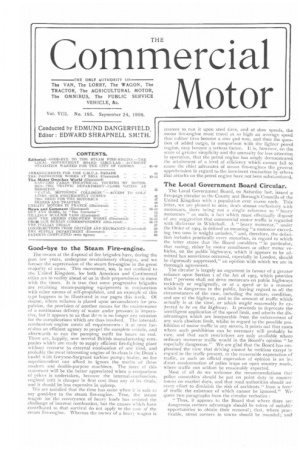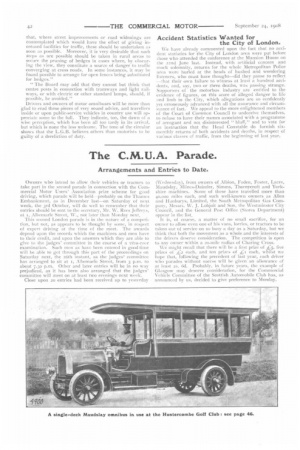Good-bye to the Steam Fire-engine.
Page 1

Page 2

If you've noticed an error in this article please click here to report it so we can fix it.
The means at the disposal of fire brigades have, during the past few years, undergone revolutionary changes, and we foresee the supercession of the steam fire-engine in the great majority of cases. This movement, too, is not confined to the United Kingdom, for both American and Continental cities are in reality ahead of us in their preparedness to move with the times. It is true that some progressive brigades are retaining steam-pumping equipments in conjunction with other means of self-propulsion, and an example of this type happens to be illustrated in our pages this week. Of course, where reliance is placed upon accumulators for propulsion, the provision of another means for the maintenance of a continuous delivery of water under pressure is imperative, but it -appears to us that there is no longer any occasion for the complications which are thus involved.. The internalcombustionengine meets all requirements : it at once furnishes an efficient agency to propel the complete vehicle, and afterwards to run the pumping outfit for hours on end. There are, happily, now several British manufacturing companies which are ready to supply efficient fire-fighting plant without recourse to external combustion of any kind, and probably the most interesting engine of its class is the Denn's model with Gwynne-Sargeant turbine pump; to-day, no lire superintendent can afford to ignore the merits of these modern and double-purpose machines. The force of this statement will be the better appreciated when a comparison of prices is undertaken, because the internal-combustion. engined unit is cheaper in first cost than any of irs rivals,• and it should be less expensive in upkeep.
We are satisfied that the time has come when itis safe to say good-bye to the steam fire-engine. True, the steam wagon for the conveyance of heavy loads has resisted the challenge of internal combustion, but the causes which have contributed to that survival do not apply to the case of the steam fire-engine. Whereas the owner of a heavy wagon is content to run it upon steel tires, and at slow speeds, the motor tire-engine must travel at so high an average speed that rubber tires become a sine quil non, and then the question of added outgo, in comparison with the lighter petrol engine, may become a serious factor. lilt, however, on the score of greater simplicity and the necessity for less attention in operation, that the petrol engine has amply demonstrated the attainment of a level of efficiency which cannot fail to cause the chief advocates of steam fire-engines the gravest apprehension in regard to the imminent realisation by others that attacks on the petrol engine have not been substantiated.
The Local Government Board Circular.
The Local Government Board, on Saturday last, issued a five-page circular to the County and Borough Councils of the United Kingdom with a population over to,000 each. This letter, we are pleased to note, deals almost exclusively with motorcars, there being not a single reference to " heavy motorcars " as such, a fact which must effectually disposeof any suggestion that commercial motor traffic is regarded with disfavour in Whitehall. A" heavy motorcar," under the Order of toe+ is defined as meaning "a motorcar exceeding two tons in weight unladen," and, therefore, the definition includes practically every motorbus, in regard to which the letter states that the Board considers " in particular, that racing, either by motor omnibuses or other motor vehicles, on the public highways, which it appears to be admitted has sometimes occurred, especially in London, should be rigorously suppressed," an opinion with which we are in thorough agreement.
The circular is largely an argument in favour of a greater reliance upon Section i of the Act of 1903, which provides that " persons shall not drive motorcars on public highways recklessly or negligently, or at a speed or in a manner which is dangerous to the public, having regard to all the circumstances of the case, including the nature, condition, and use of the highway, and to the amount of traffic which actually is at the time, or which might reasonably be expected to be on the highway. It proceeds to deprecate the untelligent application of the speed limit, and admits the disadvantages which are inseparable from the enforcement of any such absolute limit, whilst in regard to the possible prohibition of motor traffic in any streets, it points out that cases where such prohibition can be necessary will probably be rare, and that such restrictions are only available where ordinary motorcar traffic would in the Board's opinion " be especially dangerous." We are glad that the Board has emphasised the view that driving cannot he reckless except in regard to the traffic present, or the reasonable expectation of traffic, as such an official expression of opinion is an indirect condemnation of polite traps on open country roads, where traffic can seldom be reasonably expected.
Most of all do we welcome the recommendations that police constables should be put on point duty in country towns on market days, and that road authorities should usc every effort to diminish the risk of accidents " from a form of traffic the existence of which cannot be ignored." Wequote two paragraphs from the circular verbatim :
" Thus, it appears to the Board that where there are dangerous corners advantage should he taken of suitableopportunities to obtain their removal; that, where practicable, street corners in towns should be rounded ; and
that, where street improvements or road widenings arc Contemplated which would have the effect of giving increased facilities for traffic, these should be undertaken as soon as possible. Moreover, it is very desirable that such Steps as are possible should be taken in rural areas to secure the pruning of hedges in cases where, by obscuring the view, they constitute a source of danger to traffic converging at cross roads. In some instances, it may be found possible to arrange for open fences being substituted for hedges."
" The Board may add that they cannot but think that centre posts in connection with tramways and light railways, or with electric or other standard lamps, should, if possible, he avoided."
Drivers and owners of motor omnibuses will be more than glad to read these pieces of very sound advice, and travellers inside or upon public-service vehicles in country use will appreciate some to the full. They indicate, too, the dawn of a wise perception, which has been all too tardy in its arrival, but which is none the less welcome. The tone of the circular shows that the L.G.B. believes others than motorists to be guilty of a dereliction of duty.
Accident Statistics Wanted for the City of London.
We have already commented upon the fact that no accident statistics for the City of London area were put before those who attended the conference at the Mansion House on the 22nd June last. Instead, with artificial concern anti mock solemnity, returns for the whole Metropolitan Police area were hurled at the heads of hushed and wondering listeners, who must have thoug-ht—did they pause to reflect —that their own failure to witness at least a hundred accidents, and, say, two or three deaths, was passing strange. Supporters of the motorbus industry are entitled to the evidence of figures, on this score of alleged danger to life and limb in the City, which allegations are so confidently yet erroneously advanced with all the assurance and circumstance of fact. We appeal to the more enlightened members of the Court of Common Council to undeceive themselves, to refuse to have their names associated with a programme of arrogant and not disinterested " bluff," and to vote for an instruction that the I lead Constable do furnish sixmonthly returns of both accidents and deaths, in respect of var!ous classes of traffic, front the beginning of last year.




















